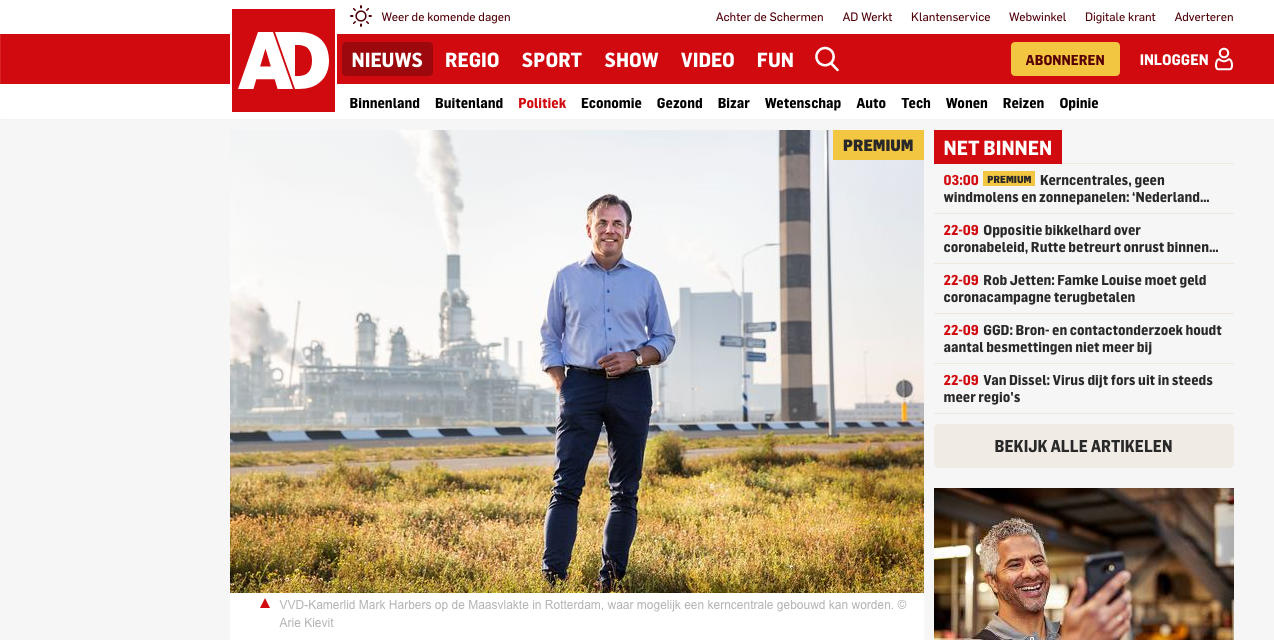VVD MP Mark Harbers pleads for new nuclear energy plants for the Netherlands. Nuclear physicist Jan Leen Kloosterman wants research money for better thorium reactors.
AD, 23-09-2020
Mark Harbers of the VVD political party asserts that the Netherlands needs nuclear power if it is to meet its climate goals. “We won’t reach our climate goals by 2050 with solar and wind energy alone,” he says in the AD newspaper. “I also don’t want an unsightly landscape dotted with wind turbines and fields of solar panels. And I don’t want to be dependent on gas from Russia. We have to start the ball rolling if we want to open a nuclear power plant after 2030. We simply need nuclear power badly.” To do this, the Government will have to pump billions into the construction of ‘three to ten’ nuclear power plants.
In the next issue of ‘Delft Outlook’, nuclear physicist Prof. Jan Leen Kloosterman (Faculty of AS) pleads for an investment of ‘only’ EUR 200 million for the development of a thorium reactor in Europe because “Europe should not be dependent on other countries for its energy”.
His story is …
In about 2005, reactor physicist Prof. Jan Leen Kloosterman heard about the thorium reactor. Up to that point, research at the Reactor Institute Delft (RID) was about the development of a safe reactor that could never cause a meltdown. Kloosterman was working on making nuclear power even more sustainable by trying to avoid long lasting radioactive waste. This can be done by using thorium as a nuclear fuel instead of uranium. The longest lasting isotopes will then need to be stored for 300 years instead of the thousands of years in the current uranium reactors.
The only snag is that the thorium cycle needs a completely different reactor design. Thorium and fission products are dissolved in molten salt that flows through the reactor as a coolant. Heat exchangers transport the heat of the nucleus (750 degrees) to steam turbines. These types of reactors are called MSRs (molten salt reactors).
“The safety aspect of MSRs is completely different to that of the reactors that we have now,” explains Kloosterman. “We are used to retaining the fission material in the core. Nothing may happen to it. The idea of the MSR is that you let the fission material flow.” When overheated, a plug beneath the reactor melts and the salt with the fission material flows out of the reactor and the chain reaction fizzles out. Engineers call this passive safety.
Kloosterman is aware that a CO2-free supply of energy from the sun and wind will have to be complemented by power from plants such as nuclear power plants. The question is should we do this with improved uranium reactors or with sustainable and passive safe thorium reactors?
‘I believe that Europe should invest in it itself’
Actually, it is a simple question. The only problem is that there are no thorium reactors as yet. TU Delft researchers have worked with European colleagues on the design, the safety aspects and simulations of MSRs since 2010. “The EU now has a good idea of how a thorium reactor will behave.”
The next step is to build an experimental structure in which researchers can work with large quantities of molten salt to see how it acts and the degree to which it resembles the simulations. Kloosterman estimates the costs for a large structure like this and the development of an MSR prototype to be around EUR 200 million.
When lobbying ministries with the technical universities and the nuclear research facility NRG in Petten, Kloosterman saw that the timeline when a thorium reactor could play a role in the energy transition was too far for politicians. Their timeline for the climate goals is 2030.
The United States and China are investing heavily in developing thorium reactors. Will we be able to simply import them at a certain point? “You really need a lot of experience with molten salt if you want to operate this type of reactor. I believe that Europe should invest in it itself. And definitely so if you want to provide energy without being dependent on other countries.”
Do you have a question or comment about this article?
j.w.wassink@tudelft.nl


Comments are closed.